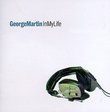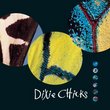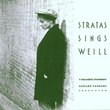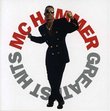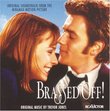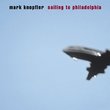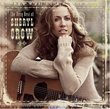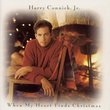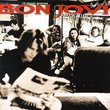| All Artists: Blind Blake Title: All the Published Sides Members Wishing: 3 Total Copies: 0 Label: Jsp Records Release Date: 8/12/2003 Album Type: Box set, Original recording remastered Genres: Country, Blues, Pop Styles: Classic Country, Traditional Blues, Vocal Pop Number of Discs: 5 SwapaCD Credits: 5 UPCs: 788065771423, 669910195550 |
Search - Blind Blake :: All the Published Sides
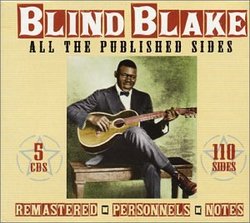 | Blind Blake All the Published Sides Genres: Country, Blues, Pop
|
Larger Image |
CD DetailsSimilarly Requested CDs
|
CD ReviewsHaunting "Gimpy" Peach Johnson | 12/12/2003 (5 out of 5 stars) "I bought this set in a local record store when I saw it discounted to twenty dollars, and figured that for four bucks a disc, I'd spring for it. I'm glad I did. Previously, I had not known much at all about Blind Blake, since my musical insterests are more in the classic ragtime, jazz, and dance bands of 1900-1935 and not so much blues, but I've been so impressed with other JSP box sets, I decided to give this one a try. Blind Blake is a legendary blues/ragtime guitar player, and from hearing the tracks in this box set, I understand why. He plays so skillfully, and his singing is easy to listen to (unlike many later blues singers who "wail" more than they sing). All of these tracks were recorded between 1926-1932 and the sound quality varies widely. Some tracks are virtually unlistenable, masked by heavy surface noise and distortion, while others are amazingly clean, clear and lifelike (just compare the two takes of "Diddie Wah Diddie" on Disc D). The blame for the poor quality rests with Paramount Records which originally recorded these sides back in the 1920s--Paramount was notorious for its poor quality recording and pressing techniques. At the same time, it is perhaps those poor quality techniques that we have to thank for having as many recordings of Blind Blake as we do. As the notes to this set explain, so many takes exist for some selections because Paramount used an inferior metal when making their record stampers. If they sold so many records, it would wear out their metal stampers and they would have to pay Blind Blake to rerecord a tune in order to continue selling it. Still, as many who would be interested in this set already know, Blind Blake's records are quite rare today, and the opportunity to have them all on CD for much, much less than the price of one original Blind Blake 78 rpm record is a real treat. This set has been a surprise "hit" with me, I've found myself listening to it more than I expected when I first bought it. At this price you can't go wrong. Thanks, JSP, for another winner." "Oh I knowed I had somethin'!" Pharoah S. Wail | Inner Space | 03/07/2004 (4 out of 5 stars) "(2/5/09 edit: It just hit me that this could be a usefull addition to this review - "Paramount 13123 finally came to light in 2007 when it was retrieved from an old steamer trunk in a trailer park in Raleigh, NC, and acquired by Marshall Wyatt of Old Hat Records." You can hear sample clips of both sides at oldhatrecords.com ) Blind Blake had it. Whatever it is that makes some people...more. Blind Blake had it. For me this is a special JSP box-set of pre-war music because with all the others I have bought so far, I had most of that music already, but I wanted to upgrade it to JSP quality. With this box, I previously only had 2 discs worth of this music. It turns out I didn't have the 2 discs with my favorite Blind Blake! There are golden yummies spread throughout this box, but for me, 1929-1932 are where Blake shines brightest. That translates to discs 4 and 5. There seems to be an extra bounce in his step on the upbeat stuff, and more of the stinging, drifting, magic notes on the slower tunes. To a certain degree though, it's all relative, as I wouldn't trade some of the earlier moments for anything. His earlier sides with Johnny Dodds, for instance. Besides Dodds, there are at times a flurry of other musicians as well. Elzadie Robinson, "Chocolate Brown" Irene Scruggs, Gus Cannon, Papa Charlie Jackson, Leola Wilson, etc... in fact, I've often wondered how great it could have been if Blake and Louis Armstrong had recorded a few sides together. Their styles would be perfect together. Blake often has a buoyancy in his music. There's no denying he was having fun! Some of his lyrics (especially when he's with other artists) just make me bust out laughing. Great stuff! By Paramount standards, the vast majority of his sides are in excellent shape, and he was a clear singer which allows for a deep study of his lyrics, unlike, say, Tommy Johnson or Blind Lemon Jefferson who are frequently much harder for me to always hear exactly what they are saying. In Blake's lyrics we get a time-capsule. From attitudes towards women, to the ways in which America has been stratified by shades of skin color. In short, there is much more here than just brilliant guitar playing. Blake definitely had alot more music left in him when his recording career ended, I for one am just thankful we got what we have, and that JSP has done such a fine (and economical for the consumer) job of presenting it." Complete Blind Blake - what more do you need?!?!?! Steven R. Sims | Australia | 09/01/2006 (5 out of 5 stars) "If you don't already know Blind Blake was guitarist nonpareil of the 20th century, then hear this! Apart from his usually great singing, always great humour, firsts like earliest recorded vocal/guitar/harp solo, his fine piano on one track, and talent to adapt his guitar accompaniment for whatever singer, pianist, jass clarinet, banjar, or bones :o) player he was with - IT'S THE GREAT GUITAR!!!
There was none better, maybe won't ever be. Songs include rags and blues, usually in natural, but also variations like dropped D & Vestapol, he really had the lot. Maybe Lonnie Johnson was more erudite, Memphis Minnie more funky, Bo Carter more versatile, Blind Boy Fuller more sassy, but Blake had all this plus virtuosity to burn. Incredible on both hands, and unbelievable fast fingers & thumbs on sides like Police Dog & Diddie Wa Diddie. I'm right now listening to this complete set from go to whoa for the second (but far from last) time. The sound is as good as can be got from these crappy old semi-cardboard Paramount 78s - can't do much more about that. Only 4 or 5 tracks that are truly painful. But it's fascinating to follow the already great Blake in 1926 - all 3 takes of both Early Morning & West Coast bear witness, but especially Too Tight - right through to Too Tight No. 2 on that immortal recording date 17 Aug 1929. The difference between these two Too Tights shows just how far he had come. 1926 version was great, 1929 is incomparable. Talk about syncopation, it's a masterpiece, and that's scarcely an adequate word. Other masterworks include Diddie Wa Diddie, Police Dog, Blind Arthur's Breakdown, Southern Rag, Georgia Blues, That'll Never Happen No More, etc. - I don't have enough superlatives to describe this music. This collection lets one follow the whole (recorded) progression of this superb guitarist and blues singer. Recommended beyond any banal adjectives. "Hey, Hey, your Daddy's feelin' blue"!" |

 Track Listings (23) - Disc #1
Track Listings (23) - Disc #1